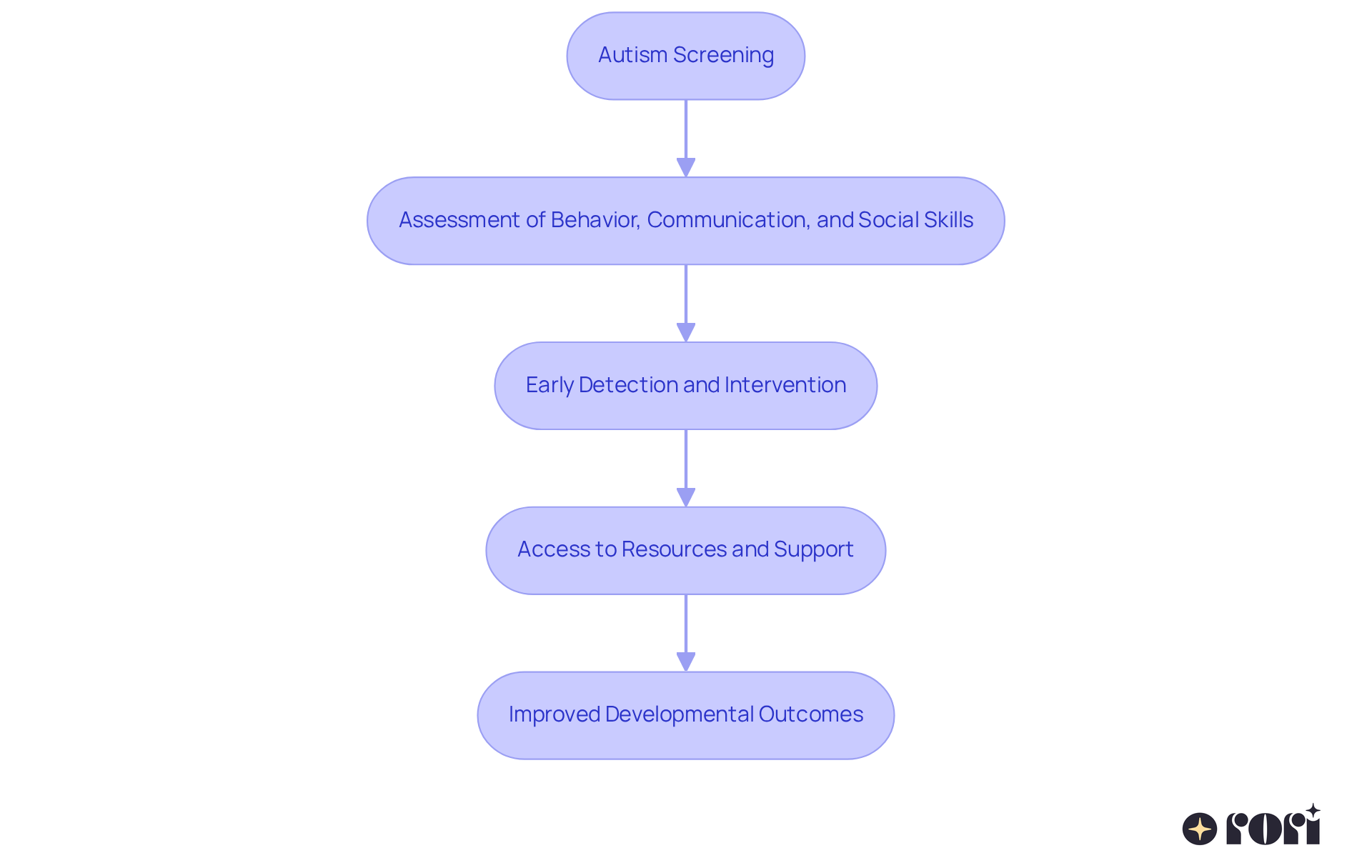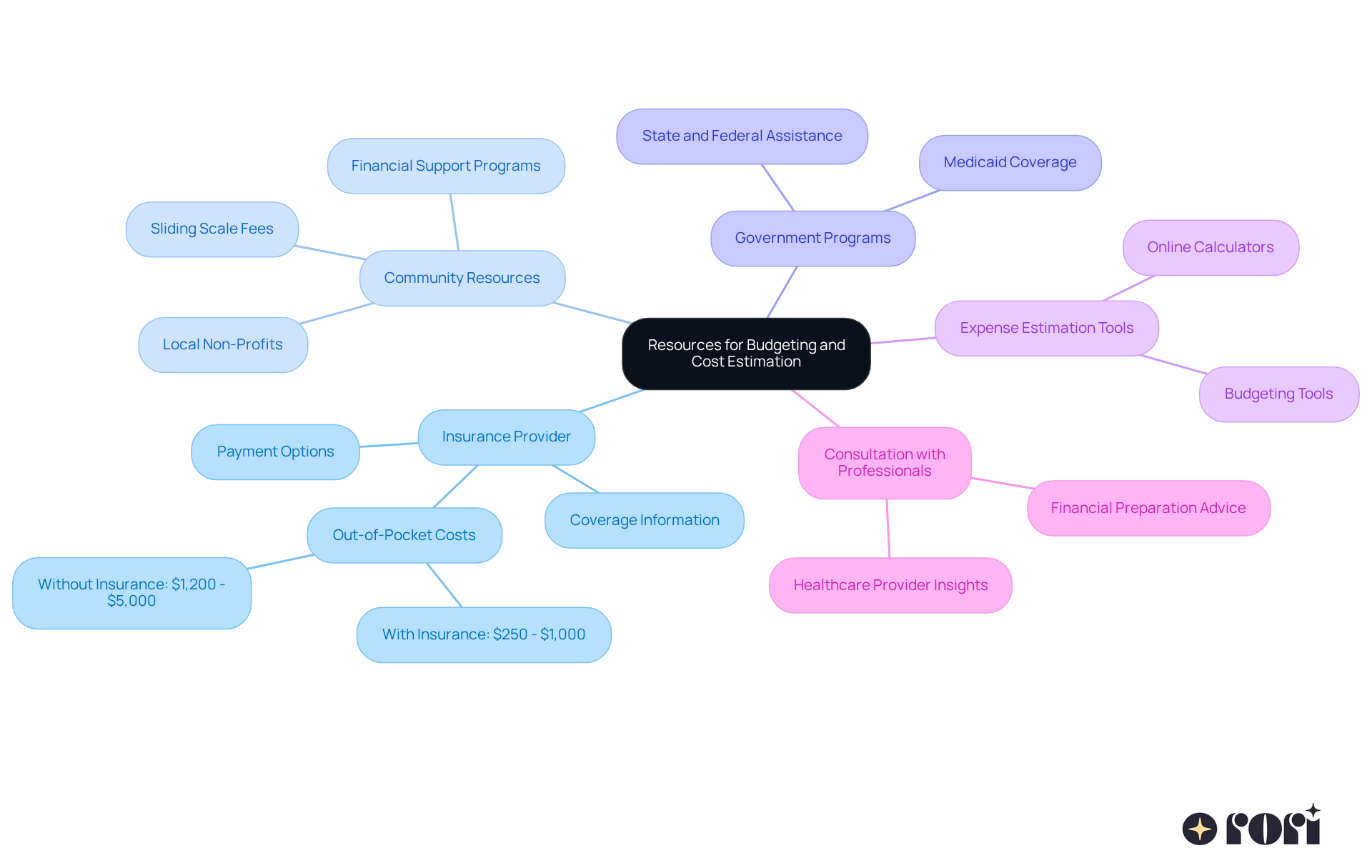When it comes to autism screenings, costs can really vary—typically falling between $1,000 and $10,000. This range depends on several factors, like:
It's important to understand these key cost factors because early detection and intervention can make a huge difference. Improved developmental outcomes for children at risk for autism spectrum disorder are within reach!
Let’s explore this together! Early detection is crucial, and knowing what to expect can help ease some of the challenges parents face. If you’re navigating this journey, remember you’re not alone. We're here to help you every step of the way!
Navigating the costs associated with autism screenings can feel overwhelming for families eager to seek early intervention for their little ones. These assessments play a vital role in identifying potential autism spectrum disorder (ASD) and can lead to meaningful developmental benefits when done promptly. Yet, the financial landscape surrounding these evaluations is anything but straightforward. Factors like provider expertise, geographic location, and insurance coverage all come into play. So, how can families untangle this web of costs while ensuring their child gets the support they need?
Let’s explore this together! Understanding these challenges is the first step toward finding the right resources and support. Remember, you’re not alone in this journey—many parents have walked this path and found ways to navigate the complexities. We’re here to help you every step of the way!
Autism evaluations are organized assessments designed to help identify children who might be at risk for autism spectrum disorder (ASD). These assessments typically involve a series of questions and observations that look at a child's behavior, communication skills, and social interactions. The importance of these screenings is huge! Early detection is key because it can lead to timely interventions that greatly enhance a child's developmental journey.
Research shows that children identified and treated before 2.5 years can see significant improvements in their symptoms within just one to two years. This really highlights how crucial early intervention can be! Screenings often serve as the first step in a comprehensive evaluation process, which might include additional diagnostic assessments if needed. By spotting the signs early on, families can access vital resources and support, ultimately improving the child's quality of life and promoting greater independence.
For instance, children who receive early intervention services from birth to three years often demonstrate remarkable developmental improvements, especially in language and social skills. This really emphasizes the transformative power of early evaluations. So, let’s explore this together and see how we can support your child’s growth!

When it comes to the cost of autism screenings, several key factors play a significant role:
Provider Type: The cost of evaluations can really vary based on who’s conducting them. Whether it’s a pediatrician, psychologist, or a specialized clinic, the fees can differ quite a bit. Highly qualified professionals, like developmental pediatricians or psychiatrists, can vary in their fees, leading to questions about how much is an autism screening, which might range from $2,000 to $9,000. This reflects their expertise and the complexity of the evaluation.
Location: Where you live is another important factor. In bustling metropolitan areas like San Francisco and Los Angeles, it is common to ask how much is an autism screening, with evaluation costs ranging from $1,000 to over $10,000. This is often due to higher demand and operational costs. On the flip side, rural areas usually offer lower prices, thanks to reduced overhead.
Insurance Coverage: Don’t forget about insurance! Your plan can greatly influence how much is an autism screening that you’ll have to pay out of pocket. Some insurance providers may cover part or all of the evaluation costs, while others might not. It’s a good idea for families to double-check their coverage and inquire about how much is an autism screening along with looking into financial support programs to help ease the burden.
Additional Services: If you’re considering thorough evaluations or follow-up assessments, keep in mind that these can increase the overall cost. Families should ask about what services are included in the screening fee to avoid any surprises later on.
Waiting Times: Lastly, waiting times for appointments can lead to higher costs. Providers might charge more for urgent services due to extended wait periods. Understanding how scheduling works can help families plan better and potentially save some money.
Navigating the costs of autism screenings can feel overwhelming, but you're not alone in this journey! Let’s explore this together and find the best path forward for your family.

Budgeting for autism screenings can feel overwhelming, but there are several resources that can help families navigate this journey:
Insurance Provider: Start by reaching out to your insurance firm for detailed coverage information regarding developmental evaluations. They can provide information about how much is an autism screening, along with a list of covered services and any out-of-pocket expenses, which often range from $250 to $1,000 for families with insurance. Don't forget to ask about payment options that might cover up to 100% of ABA treatment, making it easier for families to access essential therapies without a heavy financial burden.
Community Resources: Many local groups and non-profit organizations, like Autism Speaks, offer financial support or sliding scale fees for evaluations tied to developmental disorders. Take some time to research community resources in your area that can provide support and funding options.
Government Programs: Be sure to investigate state and federal programs designed to assist families with children on the autism spectrum. Programs such as Medicaid may cover assessment costs for eligible families, ensuring access to vital evaluations.
Expense Estimation Tools: Online calculators and budgeting tools can be incredibly useful for families trying to estimate potential expenses based on their unique situations. These tools can shed light on how much is an autism screening, which might average costs ranging from $1,000 to $5,000 for comprehensive evaluations in 2025, along with available funding options.
Consultation with professionals: Finally, don’t hesitate to speak with healthcare providers about how much is an autism screening. They can provide insights into what to expect and how to prepare financially, helping families navigate the often complex financial landscape of autism diagnosis.
Let’s explore this together! Remember, you’re not alone in this journey, and there are resources available to support you every step of the way!

Understanding the costs associated with autism screenings is so important for families looking to get early help for their children. These evaluations play a vital role, and timely screenings can really make a difference in developmental outcomes. By recognizing the value of early detection, families can tap into the resources and support they need to improve their child's quality of life.
Several factors can influence the cost of autism screenings, such as:
It's essential for families to navigate these elements to fully grasp the financial implications of screenings. Using resources like insurance providers, community organizations, and government programs can help families budget wisely and potentially ease some of the financial strain linked to these important evaluations.
Ultimately, understanding the costs of autism screenings isn’t just about the money; it’s about ensuring the best outcomes for children who may be at risk for autism spectrum disorder. Families are encouraged to take proactive steps in researching available resources and seeking support. By doing this, they can make sure that financial worries don’t stand in the way of accessing essential screenings and interventions, paving the way for a brighter future for their children. Let’s explore this together! We’re here to help you every step of the way!
What are autism screenings?
Autism screenings are organized assessments designed to identify children who might be at risk for autism spectrum disorder (ASD). They involve a series of questions and observations focused on a child's behavior, communication skills, and social interactions.
Why are autism screenings important?
Autism screenings are important because early detection of ASD can lead to timely interventions that significantly enhance a child's developmental journey. Early intervention is key to improving symptoms and overall quality of life.
What is the impact of early intervention on children with autism?
Research indicates that children identified and treated before 2.5 years can experience significant improvements in their symptoms within one to two years, particularly in areas like language and social skills.
What is the process following an autism screening?
Screenings often serve as the first step in a comprehensive evaluation process, which may include additional diagnostic assessments if necessary. This helps families access vital resources and support.
What age group benefits most from early intervention services?
Children who receive early intervention services from birth to three years often demonstrate remarkable developmental improvements, especially in language and social skills.